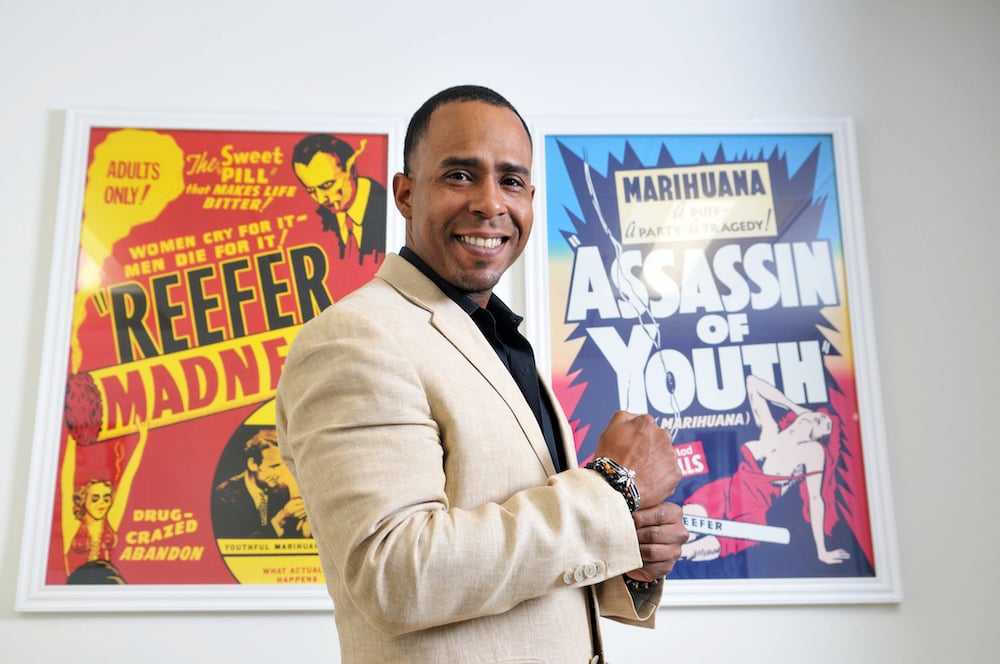
While once billion-dollar cannabis darlings go up in smoke as the industry bubble deflates, one Los Angeles company plans rapid expansion with a unique dual business model it says can muster up multiple revenue streams to survive.
Pineapple Express Cannabis Co. recently launched a $5 million common stock fundraise to develop nine cannabis stores in properties owned by its sister company, Pineapple Inc.
Six stores are to open in the Los Angeles basin and three will be in the San Fernando Valley, soon donning the same neon yellow and green branding as the company’s flagship store at tourist hotspot Hollywood and Vine. Neighborhoods mapped in the expansion include Echo Park, Van Nuys, Woodland Hills and Beverly Grove.
According to company leadership, Pineapple Express received full licensing for all locations earlier this year and plans to stagger each location’s opening throughout next year.
If all planned assets ultimately open their doors, Pineapple Express will become one of the largest cannabis dispensary chains in the state. MM Enterprises, the operator of the “Apple store” weed brand MedMen, still reigns first with 13 locations in California.
One brand opening so many stores in such a tight timeframe is unprecedented for the cannabis industry — the process for licenses from both the state and city can drag on for years in limited licensing jurisdictions. By splitting into two entities, a real estate holder and a management company, Pineapple crafted two streams of supply for people looking to operate a dispensary: offering a property to set up shop, then an incorporated management company funneling product at bulk prices.
Pineapple Inc. either leases or subleases to dispensary operators at a 25% margin. This company doesn’t touch THC buds, the strain of weed still federally illegal. Instead Pineapple Inc. handles the profit from real estate subleasing as well as sales from its hemp CBD products under the Pineapple Wellness brand. Through founder funds and outsourced fundraising, Pineapple acquired these properties between 2020 and 2022.
Shawn Credle, the chief executive for Pineapple Inc. and communications director for Pineapple Express, said the dispensary management entity now fundraises to front the $500,000 required to get a shop going — a price including everything from licensing fees to the first batch of inventory. For Credle, the potential money pouring in from a large footprint makes selling shares worth it.
“We don’t mind giving away a piece of our pie if we can expand at a faster rate,” Credle says, “It lets us expand faster so we can give more value to those shareholders.”
Matt Feinstein, chief executive of Pineapple Express, said he anticipates the close of the $5 million early next year through the over-the-counter market brokering deals with accredited investors.
In its announcement detailing the new retail locations, Pineapple Express disclosed it holds 50% equity in its dispensaries. The remaining equity belongs to the licensees who sign on to the brand, all of whom Credle says are what California has dubbed “social equity” licensees.
Social equity infrastructure

It was this social equity caveat that streamlined the license granting process for Pineapple Express. The licensing process for dispensaries is competitive – especially in metro areas with dense supply and richly funded weed operations able to fund drawn-out licensing appeals at the local level.
When cannabis was legalized in 2018, California lawmakers wanted to address historical injustices caused by the criminalization of weed and ensure underrepresented entrepreneurs from communities disproportionately affected by the drug’s illegal status. The social equity licensing system was created, and in Los Angeles the Department of Cannabis Regulation created the Social Equity Program. The department reported it received almost 1,300 applications for the cannabis business license lottery last year, and Pineapple hopes to house the winners of this city aid as Pineapple Express shop owners and operators.
“One of the things we’re trying to do is give havens to social equity licensees who don’t have a place to call home or are new
to cannabis dispensaries and don’t know how to run these things,” Credle says.
On top of holding half equity in these operations, Pineapple Express will also charge a 10% management fee from the store’s sales – a fee Credle says covers the wholesale prices the brand can get from vendors and centralized operations like human resources, marketing and customer service. For a business known for its capital-intensive opening process, social equity applicants may agree to Pineapple’s steep cut in order to survive the upfront cost. While the stores will have the Pineapple Express name, Credle maintains the local owners will be able to put their own spin on each location.
“It’s going to have our undertones and you will know it’s a Pineapple Express, but it’s going to have a lot of secret sauce from the social equity applicant from that area,” Credle said.
Cannabis woes

While Pineapple Express’s unique model may pique investors’ interest, the company will hurdle forward against industry headwinds largely out of the business’s control and in the hands of state and federal lawmakers.
Regulatory challenges, market saturation and financial constraints has pushed the industry to the edge.
Culver City-based MedMen is on financially thin ice. Its February filings with the Securities Exchange Commission revealed the company had $137.4 million in debt and had already defaulted on some of these outstanding dues. The store joins several cannabis giants
dissipating quickly as the industry bubble pops from excessive debt, stubborn competition from illegal sellers and taxes at every supply chain link.
Eaze Technologies Inc., a cannabis delivery unicorn, faced considerable legal and financial hurdles after consultants were sent to prison for creating fake retail businesses to disguise marijuana purchases.
The retail reality is expensive and still incredibly risky for investors, even as the Department of Health and Human Services recommends marijuana’s classification as a Schedule I drug, the highest-risk label by the Drug Enforcement Administration, be reclassified to Schedule III status.
Credle believes Pineapple Express’s model allows the brand to float above the industry’s costs until weed reaches legal status – a time when he says Pineapple can expand this model to other states. That is, if investors give him the green light at this point.
“I have the license to drive, and now I just need to go buy the car,” Credle says. “But it’s exciting because we have a huge upside.”
